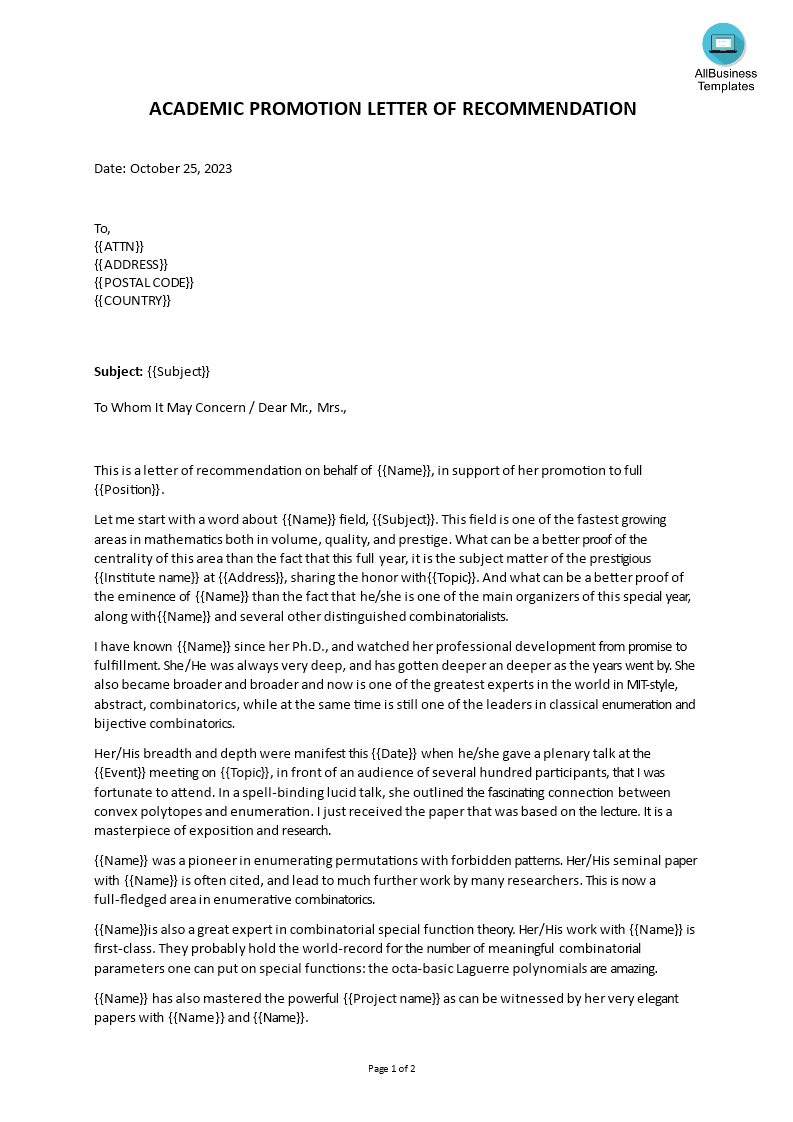Letter Of Recommendation for Academic Promotion
Save, fill-In The Blanks, Print, Done!

Download Letter Of Recommendation for Academic Promotion
Microsoft Word (.docx)Or select the format you want and we convert it for you for free:
- This Document Has Been Certified by a Professional
- 100% customizable
- This is a digital download (27.93 kB)
- Language: English
- We recommend downloading this file onto your computer.
How to draft an academic promotion letter of recommendation? What is a promotion recommendation letter? You can use this template as a guide to help you construct a strong letter of recommendation. Make sure to include specific examples of the recipient's accomplishments and how they have benefited the institution. Finally, be sure to proofread the letter before sending it off.
A letter of recommendation for academic promotion is a formal document written by a colleague, mentor, or supervisor within an academic institution to support a faculty member's application for promotion. In academia, promotions typically involve advancing from one rank or title (e.g., assistant professor) to a higher one (e.g., associate professor or full professor), and the promotion process often requires letters of recommendation to assess the candidate's qualifications.
Here's the typical format and key components of a letter of recommendation for academic promotion:
- Sender's Information: Include the recommender's name, academic title, department, institution, and contact information.
- Date: The date the letter is written.
- Recipient's Information: The name of the academic promotion committee or relevant authority responsible for reviewing and approving promotions.
- Salutation: A formal greeting, such as "Dear Members of the Promotion Committee."
- Introduction: Begin by stating the recommender's relationship with the candidate, including how long they have known and worked with the candidate. Also, briefly introduce the candidate and the purpose of the letter.
- Candidate's Qualifications: Describe the candidate's qualifications and achievements that make them deserving of the promotion. This may include details of their teaching, research, service, and other contributions to the academic institution. Provide specific examples and accomplishments.
- Comparison with Peers: Compare the candidate's performance and contributions to their peers and colleagues within the department or field, highlighting areas where the candidate stands out.
- Impact and Influence: Discuss the candidate's impact on the academic community, students, and the institution. Mention any research publications, teaching innovations, grants received, or leadership roles the candidate has undertaken.
- Leadership and Service: Address the candidate's involvement in departmental and institutional leadership, committees, and service to the academic community.
- Future Potential: Express your belief in the candidate's continued growth and potential for further contributions in their field and to the institution.
- Conclusion: Summarize your endorsement of the candidate's promotion and emphasize their value to the institution.
- Contact Information: Provide the recommender's contact information, including email and phone number, in case the committee has further questions.
- Closing: Use a formal closing, such as "Sincerely" or "Yours faithfully."
- Signature: Sign the letter by hand if it's a physical copy. For electronic submissions, a typed name may suffice.
It's crucial that the recommender is well-acquainted with the candidate's work and accomplishments and can provide a detailed and persuasive account of the candidate's suitability for promotion. The letter should be tailored to the specific promotion criteria and expectations of the academic institution. Academic promotion committees often place a high value on these letters as they play a significant role in the decision-making process.
DISCLAIMER
Nothing on this site shall be considered legal advice and no attorney-client relationship is established.
Leave a Reply. If you have any questions or remarks, feel free to post them below.
Related templates
Latest templates
Latest topics
- Formal Complaint Letter of Harrasment
How do I write a formal complaint about harassment? Check out these formal complaint letter of harrasment templates here! - Google Sheets Templates
How to work with Google Sheets templates? Where to download useful Google Sheets templates? Check out our samples here. - Letter Format
How to format a letter? Here is a brief overview of common letter formats and templates in USA and UK and get inspirited immediately! - IT Security Standards Kit
What are IT Security Standards? Check out our collection of this newly updated IT Security Kit Standard templates, including policies, controls, processes, checklists, procedures and other documents. - Excel Templates
Where do I find templates for Excel? How do I create a template in Excel? Check these editable and printable Excel Templates and download them directly!
cheese

